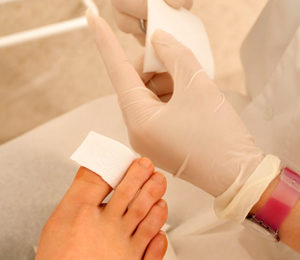
Diabetic Footcare
Receive the best treatments available
If you have diabetes, you are 15 times more likely to suffer from serious complications such as gangrene. For this reason, it is essential to keep your feet healthy and in the best possible condition. At Humberstone Foot Clinic, this should be easy and pain-free.
Home visits available
Diabetes can often leave people with feet too painful for walking. If this is the case, Humberstone Foot Clinic can provide the necessary treatments for you in the comfort of your own home.
Caring and compassionate
With over 20 years' experience working with sufferers of diabetes, the podiatrists at Humberstone Foot Clinic are experts in diabetic footcare, and understand the pain and stress that such a condition can cause.
Diabetic footcare with us
Over 20 years' experience
Modern clinic
Home visits available
Advice and support
The Diabetic Foot
Foot problems commonly develop where a person has Diabetes and are often more serious than in a healthy individual.
High levels of blood glucose over a long period of time can result in harm to the body and its functions. In the feet, the nerves and the blood supply may both be adversely affected as a result of diabetes. Nerve damage in the feet and legs may cause a loss of sensation. Any trauma or injury to the foot, for example standing on a sharp object, may not be felt and could lead to more serious complications such as an ulcer.
Diabetes can lead to a restricted blood supply in the feet and legs which may affect the ability to heal if there is an injury to the foot. The feet may appear cold and pulses will be weak where circulation is poor.
A Podiatrist can advise on a number of things that a person with diabetes can do to help avoid complications with their feet.



These include:
Examining the feet daily for cuts/swelling/scratches or discolouration.
Washing the feet daily and drying thoroughly but gently.
Avoid burning the feet. Due to reduced sensation, burns from hot water for example may not be felt.
Care when cutting toenails – if eyesight, sensation or circulation is impaired it is advisable that a Podiatrist cuts toenails.
Corns and callus should be treated by a Podiatrist.
Footwear should fit well, and shoes should be checked before wearing each time to see that there is nothing that could cause irritation to the foot such as a stone.
Stopping smoking can be helpful as circulation is worsened in smokers.
It is important for a Podiatrist to monitor any deterioration in the nerves of the feet or circulation.
This allows the patient to take the necessary precautions to help avoid any complications.


